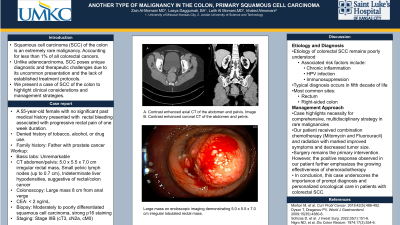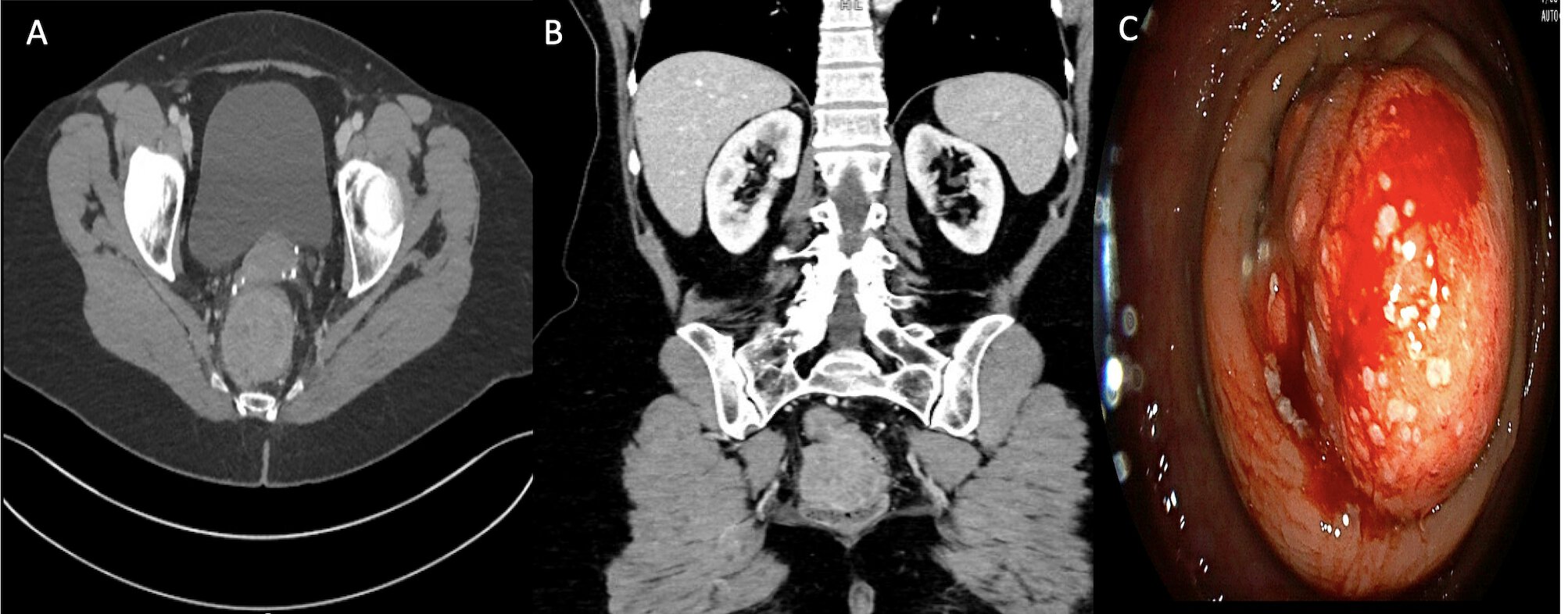Sunday Poster Session
Category: Colon
P0382 - Another Type of Malignancy in the Colon, Primary Squamous Cell Carcinoma: A Case Report
Sunday, October 27, 2024
3:30 PM - 7:00 PM ET
Location: Exhibit Hall E

Has Audio

Zain Almomani, MD
University of Missouri - Kansas City
KANSAS CITY, MO
Presenting Author(s)
Zain Almomani, MD1, Lasya Daggumati, BA2, Laith Al Momani, MD3, Khaled Almomani, 4
1University of Missouri - Kansas City, Kansas City, MO; 2University of Missouri - Kansas City School of Medicine, Kansas City, MO; 3Saint Luke's Health System of Kansas City, Kansas City, MO; 4Jordan University of Science and Technology, Ar-Ramtha, Irbid, Jordan
Introduction: Squamous cell carcinoma (SCC) of the colon is an exceedingly rare malignancy, accounting for less than 1% of all colorectal cancers. Unlike adenocarcinoma, which is the predominant type of colon cancer, SCC poses unique diagnostic and therapeutic challenges due to its uncommon presentation and the lack of established treatment protocols. Here, we present a case of SCC of the colon.
Case Description/Methods: A 55-year-old female with no significant past medical or surgical history presented to our emergency department with the complaint of rectal bleeding associated with progressive rectal pain of one week duration.
She denied any history of tobacco, alcohol, or recreational drug use. Her father had prostate cancer. She never had a colonoscopy.
Basic laboratory workup was unremarkable. A computed tomography scan of the abdomen and pelvis showed a 5.0 x 5.5 x 7.0 cm irregular rectal mass and small pelvic lymph nodes up to 0.7 cm. A follow up colonoscopy the following day found a large non-obstructing mass at the recto-sigmoid junction. Carcinoembryonic antigen level was less than 2 ng/mL. Gynecological primary etiologies were also ruled out. Biopsy showed moderately to poorly differentiated squamous cell carcinoma with strong p16 staining. The tumor was therefore classified as stage IIIB (cT3, cN2a, cM0).
The patient received combination chemotherapy (Mitomycin and Fluorouracil) and radiation with marked improvement in symptoms. Follow-up magnetic resonance imaging showed a significant decrease in tumor and lymph node size. A flexible sigmoidoscopy is now scheduled to assess the viability of the remaining tumor.
Discussion: The etiology of colorectal SCC is not well understood but has been linked to chronic inflammation, HPV infection, and immunosuppression. It is often diagnosed in the fifth decade of life, with the rectum and right-sided colon being the two most common sites. This case emphasizes the need for a comprehensive, multidisciplinary approach to managing rare malignancies like colorectal SCC. Surgery remains the primary treatment, while chemoradiotherapy is increasingly being utilized. Our patient's positive response to chemoradiation highlights its effectiveness in disease control and organ preservation. In conclusion, this case underscores the importance of prompt diagnosis and personalized oncological care in patients with colorectal SCC.

Disclosures:
Zain Almomani, MD1, Lasya Daggumati, BA2, Laith Al Momani, MD3, Khaled Almomani, 4. P0382 - Another Type of Malignancy in the Colon, Primary Squamous Cell Carcinoma: A Case Report, ACG 2024 Annual Scientific Meeting Abstracts. Philadelphia, PA: American College of Gastroenterology.
1University of Missouri - Kansas City, Kansas City, MO; 2University of Missouri - Kansas City School of Medicine, Kansas City, MO; 3Saint Luke's Health System of Kansas City, Kansas City, MO; 4Jordan University of Science and Technology, Ar-Ramtha, Irbid, Jordan
Introduction: Squamous cell carcinoma (SCC) of the colon is an exceedingly rare malignancy, accounting for less than 1% of all colorectal cancers. Unlike adenocarcinoma, which is the predominant type of colon cancer, SCC poses unique diagnostic and therapeutic challenges due to its uncommon presentation and the lack of established treatment protocols. Here, we present a case of SCC of the colon.
Case Description/Methods: A 55-year-old female with no significant past medical or surgical history presented to our emergency department with the complaint of rectal bleeding associated with progressive rectal pain of one week duration.
She denied any history of tobacco, alcohol, or recreational drug use. Her father had prostate cancer. She never had a colonoscopy.
Basic laboratory workup was unremarkable. A computed tomography scan of the abdomen and pelvis showed a 5.0 x 5.5 x 7.0 cm irregular rectal mass and small pelvic lymph nodes up to 0.7 cm. A follow up colonoscopy the following day found a large non-obstructing mass at the recto-sigmoid junction. Carcinoembryonic antigen level was less than 2 ng/mL. Gynecological primary etiologies were also ruled out. Biopsy showed moderately to poorly differentiated squamous cell carcinoma with strong p16 staining. The tumor was therefore classified as stage IIIB (cT3, cN2a, cM0).
The patient received combination chemotherapy (Mitomycin and Fluorouracil) and radiation with marked improvement in symptoms. Follow-up magnetic resonance imaging showed a significant decrease in tumor and lymph node size. A flexible sigmoidoscopy is now scheduled to assess the viability of the remaining tumor.
Discussion: The etiology of colorectal SCC is not well understood but has been linked to chronic inflammation, HPV infection, and immunosuppression. It is often diagnosed in the fifth decade of life, with the rectum and right-sided colon being the two most common sites. This case emphasizes the need for a comprehensive, multidisciplinary approach to managing rare malignancies like colorectal SCC. Surgery remains the primary treatment, while chemoradiotherapy is increasingly being utilized. Our patient's positive response to chemoradiation highlights its effectiveness in disease control and organ preservation. In conclusion, this case underscores the importance of prompt diagnosis and personalized oncological care in patients with colorectal SCC.

Figure: Image A. Contrast enhanced axial CT of the abdomen and pelvis. Image B. Contrast enhanced coronal CT of the abdomen and pelvis. Image C. Large mass on endoscopic imaging.
Disclosures:
Zain Almomani indicated no relevant financial relationships.
Lasya Daggumati indicated no relevant financial relationships.
Laith Al Momani indicated no relevant financial relationships.
Khaled Almomani indicated no relevant financial relationships.
Zain Almomani, MD1, Lasya Daggumati, BA2, Laith Al Momani, MD3, Khaled Almomani, 4. P0382 - Another Type of Malignancy in the Colon, Primary Squamous Cell Carcinoma: A Case Report, ACG 2024 Annual Scientific Meeting Abstracts. Philadelphia, PA: American College of Gastroenterology.
